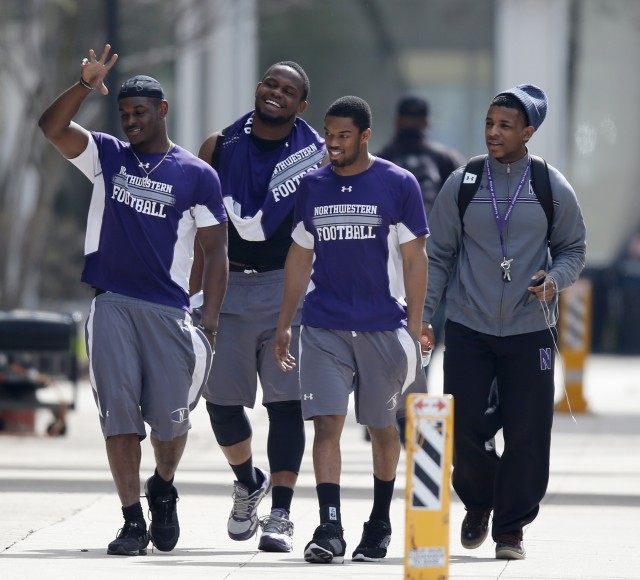The National Labor Relations Board (NLRB) voted unanimously not to recognize a labor union of student-athletes.
“We conclude that asserting jurisdiction in this case would not serve to promote stability in labor relations,” the decision explains. “Our decision today is limited to the grant-in-aid scholarship football players covered by the petition in this particular case; whether we might assert jurisdiction in another case involving grant-in-aid scholarship football players (or other types of scholarship athletes) is a question we need not and do not address at this time.”
The decision not to decide stems from a bid by Northwestern University football players to form a union. The players voted overwhelmingly to reject a union. But several players, particularly former quarterback Kain Coulter, pushed the case nonetheless.
Kain Colter gave me his thoughts on the ruling, for @USATODAYsports. http://t.co/mKTI6ICBTw pic.twitter.com/oGEl4M6TUO
— Kevin Trahan (@k_trahan) August 17, 2015
In a sense, refusing to judge the case represents a bigger defeat for the athletes than an outright loss. The body essentially said the case reads as so foreign to the disputes it adjudicates that it thought it inappropriate to intervene.
Five NLRB members agreed on refusing to recognize the Northwestern group in a 19-page decision. They wrote:
We emphasize that this case involves novel and unique circumstances. The Board has never before been asked to assert jurisdiction in a case involving college football players, or college athletes of any kind. There has never been a petition for representation before the Board in a unit of a single college team or, for that matter, a group of college teams. And the scholarship players do not fit into any analytical framework that the Board has used in cases involving other types of students or athletes. In this regard, the scholarship players bear little resemblance to the graduate student assistants or student janitors and cafeteria workers whose employee status the Board has considered in other cases. The fact that the scholarship players are students who are also athletes receiving a scholarship to participate in what has traditionally been regarded as an extracurricular activity (albeit a nationally prominent and extraordinarily lucrative one for many universities, conferences, and the NCAA) materially sets them apart from the Board’s student precedent. Yet at the same time, the scholarship players are unlike athletes in undisputedly professional leagues, given that the scholarship players are required, inter alia, to be enrolled full time as students and meet various academic requirements, and they are prohibited by NCAA regulations from engaging in many of the types of activities that professional athletes are free to engage in, such as profiting from the use of their names or likenesses. Moreover, as explained below, even if scholarship players were regarded as analogous to players for professional sports teams who are considered employees for purposes of collective bargaining, such bargaining has never involved a bargaining unit consisting of a single team’s players, where the players for competing teams were unrepresented or entirely outside the Board’s jurisdiction. As a result, nothing in our precedent requires us to assert jurisdiction in this case. Given the absence of any controlling precedent, we find it appropriate to consider whether the Board should exercise its discretion to decline to assert jurisdiction in this case, even assuming the Board is otherwise authorized to act.
An NLRB regional director judged the athletes “employees” in a ruling last year.
“The National Labor Relations Board’s decision to reject jurisdiction and dismiss the union petition in this case is appropriate,” Northwestern University held in a statement. “In its ruling, the NLRB recognized the NCAA continually evolves to better support college athletes. In recent years we have provided college athletes with multi-year scholarships, free education for former college athletes and unlimited meals. Further, college athletes helped Division I change rules in January to provide guaranteed, full cost of attendance scholarships and improve student wellbeing. The NCAA and its member schools are committed to providing the best support possible for all college athletes and will continue to do so in the future.”

COMMENTS
Please let us know if you're having issues with commenting.